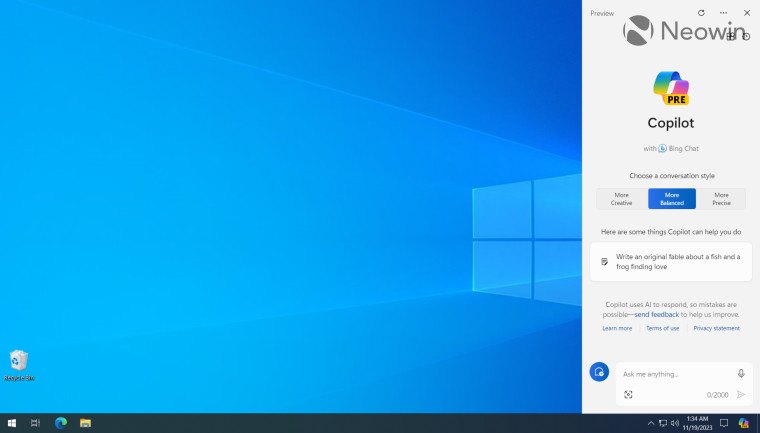
The release of Windows 11 in October 2021 ended feature development for Windows 10, leaving it as a mature, stable operating system without drama. However, in late 2023, Microsoft decided to make a U-turn and get back to the Windows 10 drawing board. The OS has already received Copilot and a new lock screen weather widget, and you can expect more soon, even though Windows 10 is less than two years away from its end of life.
I think it is safe to say that what Windows 10 currently offers is more than enough for the vast majority of its customers. Those who do not share this sentiment can compensate for the lack of specific features with third-party apps. Still, Windows 10 is too big to ignore, so get ready for new stuff in your nine-year-old operating system.

Here are five features I would like to see Windows 10 getting from its successor for a better experience. And right off the bat, I am fully confident that none of those will come to fruition. For now, it looks like Microsoft is focusing on easy jobs that can boost its service numbers, clicks, and engagement. Copilot is self-explanatory—that is just a part of Microsoft Edge with barely any Windows integration. As for the lock screen, it is nothing but a shortcut to the MSN website. A proper widget would open the stock Weather app, but Microsoft apparently thinks that is for squares.
The following things might sound minor and insignificant, but so is the new weather widget. Who asked for it, except for maybe the MSN team? So, if we are back to upgrading Windows 10, maybe let"s add something users will actually welcome and use.
1. Centered Taskbar
Hear me out: centered taskbar, but a properly made one. I am a big fan of the centered taskbar, especially on wide monitors. It is much easier to reach for apps both with your eyes and your cursor. The problem with what we have in Windows 11 is the Start menu button, which should be fixed in the bottom-left corner regardless of whether the taskbar is centered or left-aligned.
I can tolerate my apps shifting a few pixels to the left and right every now and then, but the Start menu should always sit in one place, where I can find it without thinking about it or re-training my muscle memory.
Third-party solution: TaskbarX from the Microsoft Store
2. The new Volume Mixer
Windows 11 finally has a decent stock volume mixer. Press Win + Ctrl + V, and you can switch the audio output device, turn spatial audio on or off, and adjust the volume for specific apps without navigating to the Settings app. Yes, Windows 10 still has the old volume slider from the Windows 7 era, but the one in Windows 11 is much more convenient.
Third-party solution: EarTrumpet from the Microsoft Store.
3. Decent Volume/Brightness sliders
That Windows 8 relic should be eradicated. Microsoft removed them from Windows 11 in version 22H2, and the same treatment should be applied to Windows 10. The old operating system has its distinct slider style, so Microsoft does not have to copy Windows 11"s visuals as it did with the Microsoft Store app (it looks awful on Windows 10).
Third-party solution: Modern Flyouts from the Microsoft Store.
4. Tabbed File Explorer
Tabs make everything better, which is why Windows users have been asking Microsoft to add them to File Explorer for many years. It is great to have them in Windows 11, and it would also be great to have them in Windows 10. Only with fewer bugs and better performance, preferably.
Third-party solution: The Files app from the Microsoft Store or Groupy from Stardock.
5. Windows Subsystem for Android
Tinkerers have already proved that it is possible to run WSA on Windows 10. Heck, you can even install the Google Play Store using some third-party hacks. Microsoft clearly does not mind some of Windows 11-exclusive features on Windows 10 (Copilot and the Dev Home app are just two examples), so what stops Microsoft from making the OS more useful for Android users?
Yes, some old Windows 10 machines will not run Android apps well, but there are plenty of powerful devices running Windows 10 that are perfectly capable of virtualizing Android applications without issues.
Third-party solutions: Unofficial WSA ports or all sorts of Android emulators.
Bonus: Do nothing
It was interesting to see Windows 10 users reacting to the news about Microsoft resuming Windows 10"s feature development. Many stay on Windows 10 on modern hardware because the OS is stable, snappy, and just works.
Now, some people think Microsoft will bloat Windows 10 with unnecessary and poorly made features. And let"s be honest: the current Copilot implementation is exactly that. Maybe you can leave Windows 10 as is and call it a day?
What do you think? Is there something you would like Microsoft to port from Windows 11 to Windows 10? What new features do you want to see in the old operating system? Share your thoughts in the comments.